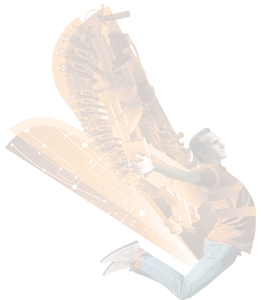Scientific Information
TUESDAY, JULY 26, 2022
11:45 - 13:15
S01 Exoskeletons
Chairs: Mohamed Bouri & Georg Rauter
013 Assistive Powered Hip Exoskeleton Improves Self-Selected Walking Speed in One Individual with Hemiparesis: A Case Study, Dante Archangeli
022 Design and Feasibility of the T-GRIP Thumb Exoskeleton to Support the Lateral Pinch Grasp of Spinal Cord Injury Patients, Claudia J.W. Haarman
041 The effect of limited sensory information on exoskeleton performance in people with complete spinal cord injury, Eline Zwijgers
O102 Design of Spiral-Cable Forearm Exoskeleton to Assist Supination for Hemiparetic Stroke Subjects, Ava Chen
O14 Knee Exoskeleton Reduces Muscle Effort and Improves Balance During Sit-to-Stand Transitions After Stroke: A Case Study, Sergei Sarkisian
O50 Stair Recognition for Robotic Exoskeleton Control using Computer Vision and Deep Learning, Andrew Garrett Kurbis
17:00 - 18:30
S07 Human-machine interfaces
Chairs: Lorenzo Masia & Claudio Castellini
019 Comparing the Usability of Alternative EEG Devices to Traditional Electrode Caps for SSVEP-BCI Controlled Assistive Robots, Ana Sofia Santos Cardoso
040 An Analysis of Intention Detection Strategies to Control Advanced Assistive Technologies at the CYBATHLON, Jessica Gantenbein
051 Characterizing Sensory Thresholds and Intensity Sensitivity of Regenerative Peripheral Nerve Interfaces: A Case Study, Michael Gonzalez
068 Evaluation of Multi-Layer Perceptron Neural Networks in Predicting Ankle Dorsiflexion in Healthy Adults Using Movement-Related Cortical Potentials for BCI-Neurofeedback Applications, Ahad Behboodi
072 Scalp-Targeted Haptic Proprioception for Upper-Limb Prosthetics, Michael D. Naish
O107 Control Interface Remapping for Bias-Aware Assistive Teleoperation, Andrew Thompson
WEDNESDAY, JULY 27, 2022
11:45 - 13:15
S14 Biomechanics and New Technologies and Methodologies in Human Movement Analysis
Chairs: Rui Loureiro & Laura Marchal Crespo
O52 Quantification of the Development of Trunk Control in Healthy Infants Using Inertial Measurement Units, Katherine Poggensee
O57 Sleep Position Detection for Closed-Loop Treatment of Sleep-Related Breathing Disorders, Alexander Breuss
O59 Development of an Interactive Total Body Robot Enhanced Imitation Therapy for ASD Children, Gabriele Fassina
O67 Correlating Vibration Patterns to Perception of Tactile Information for Long-Term Prosthesis Use and Continued Rehabilitation of Neuropathic Pain, Morenike Abisola Daniella Magbagbeola
O36 Varying Joint Patterns and Compensatory Strategies Can Lead to the Same Functional Gait Outcomes: A Case Study, Tomislav Bacek
O89 Accurate Real-Time Phase Estimation for Normal and Asymmetric Gait, Mohammad Shushtari
13:45 - 14:45
ICORR GENERAL ASSEMBLY MEETING
17:00 - 18:30
S21 Design and Development in Rehabilitation Robotics
Chairs: Robert Riener & Tommaso Lenzi
O24 Towards Unsupervised Rehabilitation: Development of a Portable Compliant Device for Sensorimotor Hand Rehabilitation, Raphael Rätz
O29 Improving Ankle Muscle Recruitment Via Plantar Pressure Biofeedback During Robot Resisted Gait Training in Cerebral Palsy, Zachary Lerner
O34 Haptic Feedback System for Postural Adaptation During Robotic Rehabilitation of Upper Limb, Rakhi Agarwal
O79 Learning Dynamic Patient-Robot Task Assignment and Scheduling for a Robotic Rehabilitation Gym, Bikranta Adhikari
O98 Modeling the Influence of the Human Form and Ambulation Context on Moment and Power-Generating Abilities of Soft Hip-Flexion Exosuits, Ross Michael Neuman
O104 Effect of variable transmission on body-powered prosthetic grasping, Michael Abbott
THURSDAY, JULY 28, 2022
11:45 - 13:15
S28 Award Finalists
Chairs: Ana Luisa Trejos & Edwin van Asseldonk
O48 A Primarily-Passive Knee Prosthesis with Powered Stance and Swing Assistance, Steven Culver
O53 ARMStick - an Intuitive Therapist Interface for Upper-Limb Rehabilitation Robots, Michael Sommerhalder
O60 Spatiotemporal Coupling of Hand and Eye Movements When Using a Myoelectric Prosthetic Hand, Kodi Cheng
O64 Design and Preliminary Evaluation of a Robot-Assisted Assessment-Driven Finger Proprioception Therapy, Monika Zbytniewska-Mégret
O66 Redistributing Ground Reaction Forces During Squatting Using a Cable-Driven Robotic Device, Tatiana D. Luna
O100 Proof-Of-Concept: A Hands-Free Interface for Robot-Assisted Self-Feeding, John Schultz
15:40 - 17:10
S35 Prosthesis, Assistive Robotics, Clinical Evaluation Studies
Chairs: Emilia Ambrosini & Gerdienke Prange
O9 On the Change in Speech Quality and Speed with a Tongue Interface for Control of Rehabilitation Robotics – a Case Report, Ásgerður A. Pálsdóttir
O20 Evaluation of the implementation of Armeo®Spring in a specialized neurorehabilitation center, Helena Kvist Rindom & Kristine Bach Christensen
O54 Automatic and Personalized Adaptation of Therapy Parameters for Unsupervised Robot-Assisted Rehabilitation: A Pilot Evaluation, Giada Devittori
O55 Adaptive Hybrid FES-Force Controller for Arm Exosuit, Davide Burchielli
O76 Towards Instant Calibration in Myoelectric Prosthetic Hands: A Highly Data-Efficient Controller Based on the Wasserstein Distance, Digby Chappell
O111 A Random Tree Forest Decision Support System to Personalize Upper Extremity Robot-Assisted Rehabilitation in Stroke: A Pilot Study, Cristian Camardella

